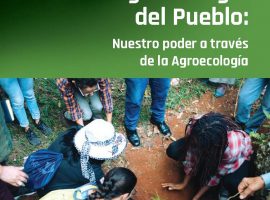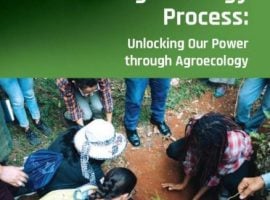For Mother’s Day we want to highlight women who are fighting for food sovereignty to protect their families’ human rights and provide their children with the nutritious food they need. Below is an excerpt from WhyHunger’s “Through Her Eyes: The Struggle for Food Sovereignty” publication which features dialogue between Yesica Ramirez and Elvira Carvajal of the Farmworkers Association of Florida, and Kathia Ramirez of CATA – Farmworkers Support Committee. They discuss the harmful effects that agrochemicals on agricultural workers and the solutions we should be striving for.
Kathia: All agricultural workers are exposed to pesticides that damage their health. In the area where we work, I have observed how women use different layers of clothing to protect against chemicals, and though all workers who work directly in the fields are at risk, I think women take more serious risks — especially if they are pregnant. The baby will be at high risk and may be born with health difficulties like a deformity or perhaps a mental problem. Or possibly the girls, who in the future would like to have families, will sometimes not have the joy of being mothers because these chemicals can cause infertility.
Elvira: Not only agricultural workers — but all of us — even those who do not work in agriculture — are exposed to chemicals, mainly in our water. Not only does it damage the water we drink, but all the animals that live in [the water], and so we’re affected again when we consume fish. Farmworkers are also affected mentally and physically; their bodies are poisoned, but also their minds and hearts because of the verbal and physical abuse they often have to deal with. The short- term symptoms [of pesticide exposure] are skin rashes, hives, itching and redness of the skin. In the medium term, it is bone pain, sometimes dizziness and a continuation of the short-term symptoms. There was one case of a woman who had just started the job and she said her knees and feet really hurt. She went home and went to bed and then began to vomit. She is still suffering from joint pains.
Yesica: I remember when we came here to the United States we started working in the plant nursery without knowing anything about chemicals. So, we wore long-sleeved shirts because we saw other people wearing them, but we did not know why. Fast forward to 2010 when I was pregnant with one of my babies. But then I heard of the Farmworker Association and I took the training they offered. I learned how to protect myself and the importance of doing so. When my child was born, she was born with many health problems. She had an underdeveloped skull, sleep apnea, and eczema. I was always at the doctor and deep down I knew this happened because of the chemicals. So, when I speak to women about the importance of protecting themselves and their children, I speak from the heart because of what happened to me. I do not want them to go through the same thing. So when I hear testimonies of women who come to me and tell me, “Look, I’m protecting myself. And now they give us water at work,” you see the results you have sown. It gives me great satisfaction that the community responds in that way.
Elvira: Personally, when I worked in the fields, I lost a baby at six months. Afterwards I was informed that it was because of the chemicals I was exposed to daily at work. Right now, we know of a family living in a very large commercial nursery. It has about 6,000 employees. We sometimes find families with children, and sometimes couples who do not have children, living in the nursery. We have seen children hanging clothes outside, and about 50 or 100 feet from where they are playing is the greenhouse with the pesticides. All around them [inside the nursery] are the plants that are being treated with chemicals. So, the families and children are directly exposed and affected. We are trying to document all this information. We also remember a time when there was a hurricane here. [The Farmworker Association] visited some farms and found families living in animal stalls. We started legal processes which ended with the families being removed. So, in one way, we help people [to get out of dangerous living conditions]. But then they may no longer have housing. But if they stay in those places they are endangering their lives, so we also sometimes feel powerless to help.
Kathia: I think that in industrial agriculture everything is based on money. Farmers compete to see who makes more than the other. Agriculture is based on the model of getting rich, and not necessarily focused on the model of feeding the people, as it should be.
Elvira: I believe that the interest of industrial agriculture is to produce quantity over quality; they do not care about anyone’s health. What matters to them is production and profit, and we are now trying to raise awareness that people want quality. We know that if you’re eating a carrot like the ones we grab from our garden, they may not be thick or large like those sold in the store, but the taste is so different — better.
Yesica: I remember back to the time in my childhood, when we were living in the countryside. As a child I could enter the field to work and there was no danger because there were no pesticides at the time. People sold food locally or exchanged food between them. For example, someone went by in the market and said “I’ll exchange peaches for guavas or tomatoes for onions.” So, that was a good thing and we had much access to food. Even though we were poor, at least we could have healthy food. Today, farmworkers have little access to healthy food. It’s cheaper for you to buy a maruchan (junk food) than to buy a kilo or a pound of some fruit because healthy food is expensive.
Kathia: CATA (Farmworkers Support Committee – CATA) participated in the public comment period for the rules protecting workers as a part of our work to reduce the use of pesticides in agricultural products. As a follow up to this initiative, we started a campaign for food justice. We think the conditions [for farmworkers] will not improve just by changing some rules. The food justice campaign is based on the need to improve our food system — not only for workers but also for consumers and farmers. Pesticides are destroying not only our people but also our planet. CATA, along with three other organizations, initiated an interest group to develop fair standards for people involved in sustainable and organic agriculture. Through those standards, we created a label of approval, a kind of certification for “just food.” It’s called Agricultural Justice Project. Part of our food justice campaign has been to expand the label and certify more and more farms to follow these rules, to produce organically using no chemicals and, more than anything, to protect and treat workers fairly. So, not only do we want to raise awareness about the label within businesses and farms, but we must also educate workers, communities, individuals, consumers and other organizations involved. Our goal is to grow the campaign and at the same time, get the support of friends and allies so that we can work together to create a fair system, especially for workers who are essential to the whole process.
As another initiative within the campaign for food justice, we have community gardens that are for the low-income community and agricultural workers to help them to eat healthier. Organic food that is free of chemicals is expensive and, with a minimum wage that is not enough to live on, low-income communities have no other option but to consume cheap and unhealthy food. So that’s why CATA offers space, seeds, tools, and water for the community to grow their own organic produce. They take home the food they harvest in exchange for their time in the garden. For the rest of the community, these foods are available to buy at low prices. Our community gardens have become a place of learning and working collectively. Now we’re thinking of including trainings about making compost, growing in small spaces, increasing production, and saving seeds.
Elvira: It is sometimes difficult to do outreach to farmworkers to raise awareness about the hazards in their work areas. We use workers’ rights trainings as a way to identify different types of workplace violations, but also to provide follow-up to specific cases. We need to convince workers to make a complaint to the agency that is responsible for enforcement and encourage them to stick with it until the end, which we know will be long and hard. At first when they are in the workshops they’ll say, “Yes, we are going through with this.” But when we identify violations and want to document them, sometimes the workers no longer want to. They want to change the conversation and do not want to follow-up on the case, for fear of job loss or other retaliation. It’s our job as organizers, to convince them to continue in order to stop such violations for everyone.
Kathia: I think many grassroots organizations and organizations of agricultural workers are doing a lot of organizing around the conditions of workers. Therefore, I think personal narrative and testimony is very powerful and perhaps could be a method of communication to consumers. Friends and allies can become aware of the situation from the first person point of view of someone who is facing these realities every day. Also, it helps us to start delving into how many people do not really think deeply about where their food comes from and helps us bring awareness about how essential agricultural workers are so that we can feed ourselves.
The term agroecology is a term that most agricultural workers do not use in their daily lives, yet they are familiar with the practice. Agroecology is a technical term that has emerged and is being used more often. But agroecology is what many farmworkers know as natural and organic planting, using the basic tools that do not depend on large machinery or chemicals for the growth and maturity of the plants. Some agricultural workers who were farmers and had access to land in their countries of origin used ancestral practices, and one of those practices was natural and traditional medicine. More than anything women have knowledge of natural medicine and they often prescribe certain herbs or plants for different injuries or illnesses. Last year CATA began a series of activities related to traditional herbal medicine since we know that many people who do not have legal status in this country also do not have access to good health insurance. Even though they won’t always be able to treat a disease with natural medicine, it is a relief to many in the community. As these skills are related to agroecology, they can be a source to share and connect with other organizations and other people who know about this and have the same wisdom.
Elvira: I think all mothers want our children to be well fed; we seek the best for them. I think that agroecology is a movement with principles and values for all those who care for and protect the earth. This is what we practice in the Campesinos’ Gardens with many farmworker families. The Campesinos’ Gardens were started by farmworker leaders in the community of Fellsmere in 2010, and have since expanded to three additional farmworker communities. The gardens serve as agroecology demonstration sites to reclaim traditional growing knowledge, to reconnect to the natural elements in order to inspire people to live differently and better, and to exemplify potential small-scale farm economic development opportunities. The garden sites have not only increased the availability of healthy, fresh, chemical-free foods among farmworker families, but have also provided the opportunity to deepen mutually-beneficial relationships with local governments and a sister non-profit organization through collaborative, productive use of underutilized lands.
Yesica: We are mothers and as mothers we will care for our children. We are the ones that do most of the food shopping and cooking. We therefore play an important role. And there’s that phrase that says ‘we are what we eat,’ right? Earlier, we mentioned that before people lived longer and were healthier and now children are born sick or get sick a lot. We see it every day with people who are not that old but tend to have more health issues than people who came before them. It is good to grow healthy food but also to grow awareness in the community and make the community stronger and united. Also, to capture the wisdom and pass it to the next generation. This is one of our roles as women.
Kathia: There is an urgency about passing on that wisdom — everything that our parents and our grandparents shared with us. Specifically in terms of working the land, many farmers leave their home countries because of poverty and, as a result, those towns that have a wealth of culture are disappearing. And today, it sometimes seems that young people have no interest in continuing to learn who they are, right? And the question becomes how can we come together to ensure it does not end there, that it does not die there.
Want to read more stories about women working for food sovereignty and sustainable agriculture? Download “Through Her Eyes: The Struggle for Food Sovereignty” today.






